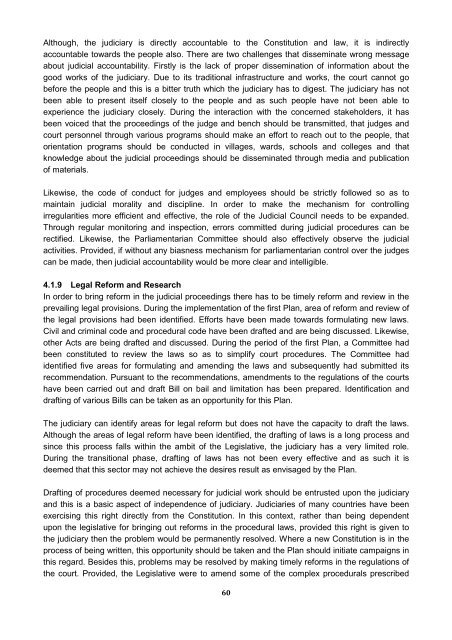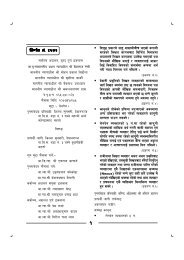The Nepali Judiciary - Supreme Court Of Nepal
The Nepali Judiciary - Supreme Court Of Nepal
The Nepali Judiciary - Supreme Court Of Nepal
Create successful ePaper yourself
Turn your PDF publications into a flip-book with our unique Google optimized e-Paper software.
Although, the judiciary is directly accountable to the Constitution and law, it is indirectly<br />
accountable towards the people also. <strong>The</strong>re are two challenges that disseminate wrong message<br />
about judicial accountability. Firstly is the lack of proper dissemination of information about the<br />
good works of the judiciary. Due to its traditional infrastructure and works, the court cannot go<br />
before the people and this is a bitter truth which the judiciary has to digest. <strong>The</strong> judiciary has not<br />
been able to present itself closely to the people and as such people have not been able to<br />
experience the judiciary closely. During the interaction with the concerned stakeholders, it has<br />
been voiced that the proceedings of the judge and bench should be transmitted, that judges and<br />
court personnel through various programs should make an effort to reach out to the people, that<br />
orientation programs should be conducted in villages, wards, schools and colleges and that<br />
knowledge about the judicial proceedings should be disseminated through media and publication<br />
of materials.<br />
Likewise, the code of conduct for judges and employees should be strictly followed so as to<br />
maintain judicial morality and discipline. In order to make the mechanism for controlling<br />
irregularities more efficient and effective, the role of the Judicial Council needs to be expanded.<br />
Through regular monitoring and inspection, errors committed during judicial procedures can be<br />
rectified. Likewise, the Parliamentarian Committee should also effectively observe the judicial<br />
activities. Provided, if without any biasness mechanism for parliamentarian control over the judges<br />
can be made, then judicial accountability would be more clear and intelligible.<br />
4.1.9 Legal Reform and Research<br />
In order to bring reform in the judicial proceedings there has to be timely reform and review in the<br />
prevailing legal provisions. During the implementation of the first Plan, area of reform and review of<br />
the legal provisions had been identified. Efforts have been made towards formulating new laws.<br />
Civil and criminal code and procedural code have been drafted and are being discussed. Likewise,<br />
other Acts are being drafted and discussed. During the period of the first Plan, a Committee had<br />
been constituted to review the laws so as to simplify court procedures. <strong>The</strong> Committee had<br />
identified five areas for formulating and amending the laws and subsequently had submitted its<br />
recommendation. Pursuant to the recommendations, amendments to the regulations of the courts<br />
have been carried out and draft Bill on bail and limitation has been prepared. Identification and<br />
drafting of various Bills can be taken as an opportunity for this Plan.<br />
<strong>The</strong> judiciary can identify areas for legal reform but does not have the capacity to draft the laws.<br />
Although the areas of legal reform have been identified, the drafting of laws is a long process and<br />
since this process falls within the ambit of the Legislative, the judiciary has a very limited role.<br />
During the transitional phase, drafting of laws has not been every effective and as such it is<br />
deemed that this sector may not achieve the desires result as envisaged by the Plan.<br />
Drafting of procedures deemed necessary for judicial work should be entrusted upon the judiciary<br />
and this is a basic aspect of independence of judiciary. Judiciaries of many countries have been<br />
exercising this right directly from the Constitution. In this context, rather than being dependent<br />
upon the legislative for bringing out reforms in the procedural laws, provided this right is given to<br />
the judiciary then the problem would be permanently resolved. Where a new Constitution is in the<br />
process of being written, this opportunity should be taken and the Plan should initiate campaigns in<br />
this regard. Besides this, problems may be resolved by making timely reforms in the regulations of<br />
the court. Provided, the Legislative were to amend some of the complex procedurals prescribed<br />
60




![lg0f{o g+=&(&# g]=sf=k= @)^% ;af]{Rr cbfnt ljz]if Ohnf; ;DdfggLo k ...](https://img.yumpu.com/10045627/1/190x245/lg0fo-g-gsfk-afrr-cbfnt-ljzif-ohnf-ddfgglo-k-.jpg?quality=85)
![lg0f{o g+=&(@% g]=sf=k= @)^% ;jf]{Rr cbfnt, ljz]if Ohnf; dfggLo ...](https://img.yumpu.com/6479513/1/190x245/lg0fo-g-gsfk-jfrr-cbfnt-ljzif-ohnf-dfgglo-.jpg?quality=85)

![lgj]b s ljkIfL - Supreme Court Of Nepal](https://img.yumpu.com/5482729/1/190x245/lgjb-s-ljkifl-supreme-court-of-nepal.jpg?quality=85)